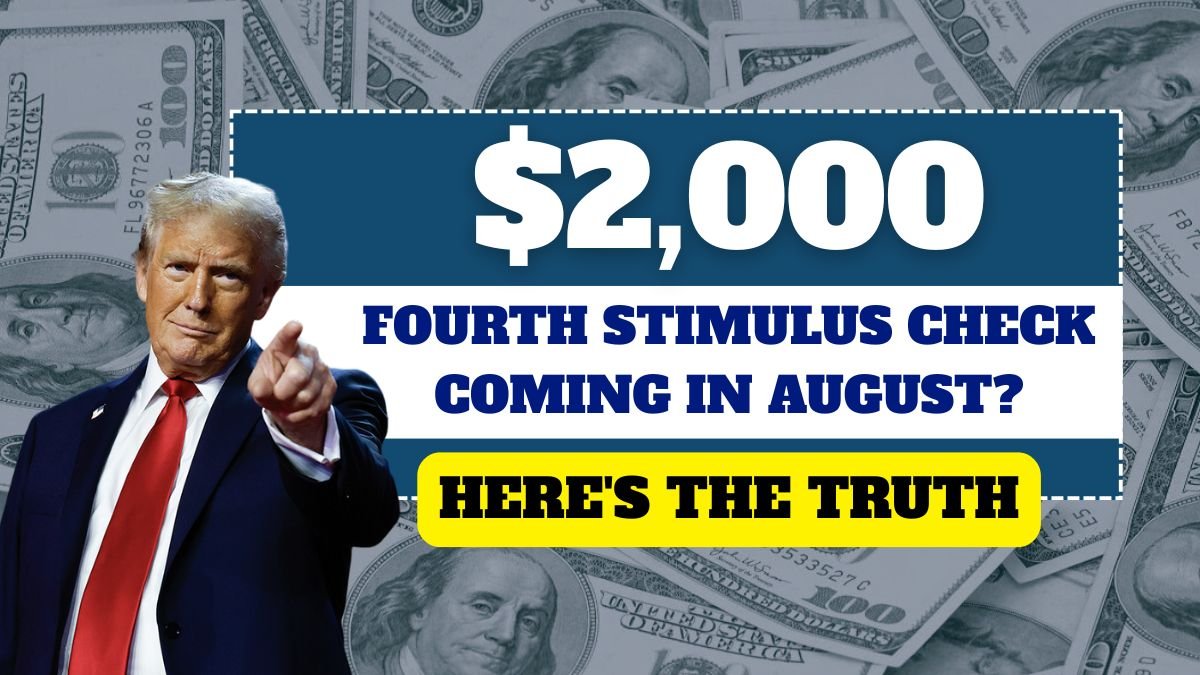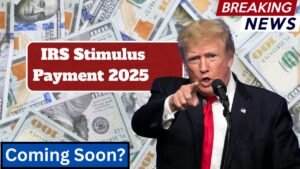In today’s time, the world of social media and the internet has become so fast that any news becomes viral in a few hours, whether it is official or just a rumor. Something similar has happened recently with the news, in which it has been claimed that American citizens are going to get a fourth stimulus check of $2,000 in July and August 2025. This news has raised enthusiasm and hope, especially among those who are struggling with rising inflation, rent, medicines and everyday expenses. But is there any truth in this claim? Is the federal government or IRS really going to give any such new payment? Let’s know the answers to all these questions in detail.
Where did the rumors of the fourth stimulus check start?
The discussion about the fourth stimulus check started through some articles and videos going viral on social media. One article in particular said that the US government and Congress are considering a new relief package of $2,000, which could be implemented in July or August 2025. The article also said that if the proposal is passed, payments could begin in late 2025 or early 2026.
The article said that those eligible are single filers with an annual income of less than $75,000 or those married with a combined income of less than $150,000. There is also talk of additional amounts for dependent children. This news came as a relief to those who have benefited from all three stimulus checks received during COVID-19.
What do the IRS and Congress say?
When official sources were checked to find out the truth of these reports, it became clear that neither the US Internal Revenue Service (IRS) nor the Congress has approved any plan for a fourth stimulus check of $2,000 so far. The IRS’s recent press release, IR-2025-75, which was published on July 15, 2025, discusses tax filing and security measures, but there is no mention of any new stimulus payments anywhere.
It is also important to know that so far only three stimulus checks have been given in the US, and the last check was issued in 2021 under the American Rescue Plan, which paid a maximum of $1,400 per person. After this, no new relief package of any kind has been passed by law.
The reality of DOGE Dividend
In February 2025, a proposal was presented by former President Donald Trump, which was named “DOGE Dividend.” Under this, it was said to distribute the savings from the administrative efficiency of the government to the common citizens. It was estimated that this would save $130 billion and each taxpayer could get about $5,000.
But this proposal has neither been able to get the approval of Congress nor has any clear timeline been given for its implementation. Apart from this, experts also believe that if this amount is distributed among all taxpayers, then each person will get an average of only $807, which is much less than $2,000.
Inflation and everyday problems have become a big reason
The impact of inflation is being felt in every corner of America. From food items to rent, medicines and medical insurance, the prices of everything are increasing. Especially retired citizens, senior citizens and people of low-income groups are most affected by this situation.
However, the Social Security Administration has implemented the Cost-of-Living Adjustment (COLA) for 2025, which has provided some relief. But this relief seems very small in front of the increasing burden of inflation. This is the reason why the expectations of such stimulus checks always remain among the common citizens.
Rising rumors and scam risk on social media
Whenever rumors of such relief schemes spread, scammers and fraudsters become active. Many fake websites and social media accounts start asking people to fill fake forms, through which they steal people’s personal information. The IRS has warned that citizens should get information only from official websites like irs.gov and not trust any unknown links or emails.
In addition, people spreading fake calls, messages and fraudulent schemes become active, who try to steal sensitive information like your bank details or social security number by luring you with false promises.
Are state governments providing relief?
Although there is no new stimulus check from the federal government, some state governments are running relief schemes at the local level. For example:
- Inflation relief checks of $200–$400 are being given to some eligible residents in New York.
- In California, some new mothers are receiving $1,000 per month in assistance under the Abundant Birth Project.
- In Mississippi, a scheme called Magnolia Mother’s Trust is providing $1,000 monthly assistance to selected women.
However, these are all state-level schemes and have no connection with the federal $2,000 stimulus check. But people are being confused by misrepresenting these schemes on social media.
Conclusion: Rumors are strong, but the truth is completely different.
In summary, no fourth stimulus check of $2,000 in July and August 2025 has been passed by Congress yet, nor has the IRS or Treasury Department confirmed any such plan. Do not be confused by rumors and unofficial articles spreading on social media.
If you are waiting for some kind of relief, you should get information only from official sources. From all the information available at the moment, it is clear that the fourth stimulus check is only a rumor, which has no official basis.
FAQs
Q. Is a $2,000 fourth stimulus check confirmed for July or August 2025?
A. No, as of now, there is no official confirmation from the IRS or Congress regarding a fourth stimulus check.
Q. Where did the $2,000 stimulus check rumors come from?
A. The rumors originated from unverified social media posts and speculative articles, but they lack any legal or government backing.
Q. Has any legislation for a new stimulus payment passed?
A. No new federal stimulus legislation has been passed by Congress since the third round in 2021.
Q. Are there any legitimate payments being sent in 2025?
A. Yes, the IRS is distributing unclaimed 2021 Recovery Rebate Credits through January 2025, but there’s no new stimulus check for 2025.
Q. Should I trust texts or forms asking for my info about a stimulus check?
A. No. The IRS warns against scams and advises checking only irs.gov for accurate information.


